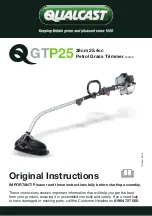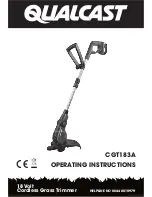
4
Always wear a shoulder strap or
a harness when operating a unit
equipped with a blade.
Wear appropriate footwear (non-skid
boots or shoes): do not wear open-
toed shoes or sandals. Never work
barefooted!
The Properly Equipped Operator
Wear hearing protection devices
and a broad-brimmed hat or helmet.
Wear close-fitting clothing to protect legs
and arms. Gloves offer added protection
and are strongly recommended. Do not
wear clothing or jewelry that could get
caught in machinery or underbrush.
NEVER wear shorts!
Always wear eye protection such as
goggles or safety glasses.
Always operate with both hands
firmly gripping the unit.
When operating with a blade, make sure
the handle is positioned to provide you with
maximum protection from contacting the blade.
Keep away from the rotating trimming
line or blade at all times, and never lift a
moving attachment above waist-high.
Keep a proper
footing and do not
overreach—maintain
your balance at
all times during
operation.
Always make sure the appropriate
cutting attachment shield is correctly
installed.
Figure 2
Be Aware of the Working Environment
Avoid long-term
operation in very hot or
very cold weather.
Make sure bystanders or
observers outside the 50-
foot “danger zone” wear eye
protection.
Be extremely careful of slippery
terrain, especially during rainy
weather.
Beware of a coasting
blade when brushcutting
or edging. A coasting
blade can injure while it
continues to spin after
the throttle trigger is
released or after the
engine is stopped.
When operating in rocky terrain or
near electric wires or fences, use
extreme caution to avoid contacting
such items with the cutting
attachment.
Be constantly alert for objects and debris
that could be thrown either from the rotating
cutting attachment or bounced from a hard
surface.
If contact is made with a hard
object, stop the engine and
inspect the cutting attachment for
damage.
50 FEET
Reduce the risk
of bystanders
being struck by
flying debris. Make
sure no one is
within 50 feet (15
meters)—that’s
about 16 paces—of
an operating
attachment.
Figure 3





































